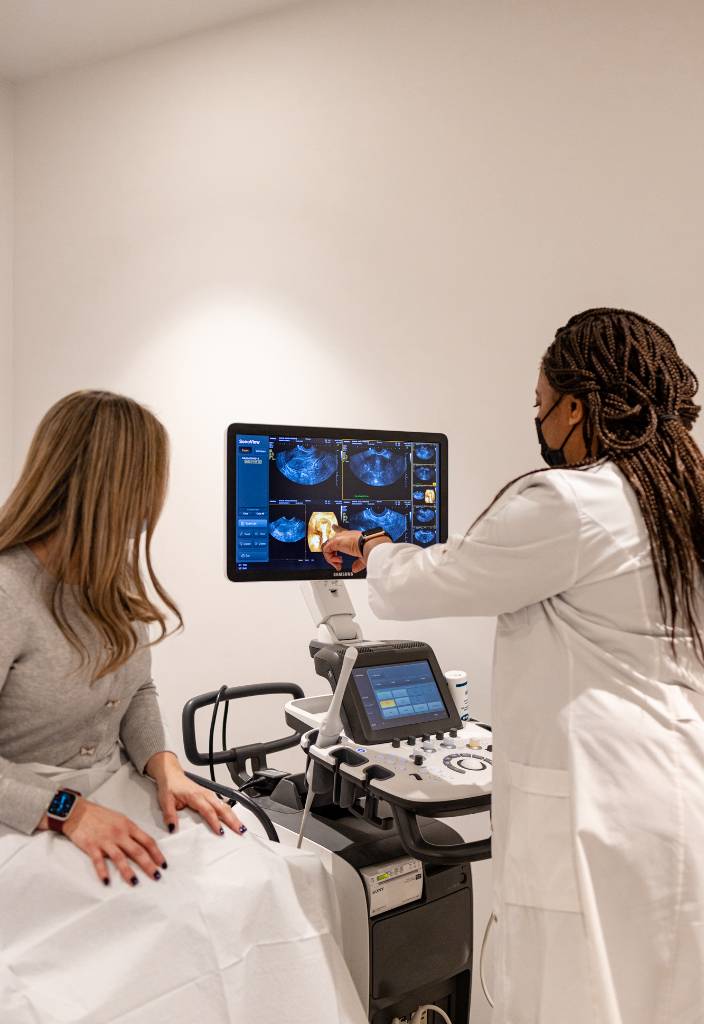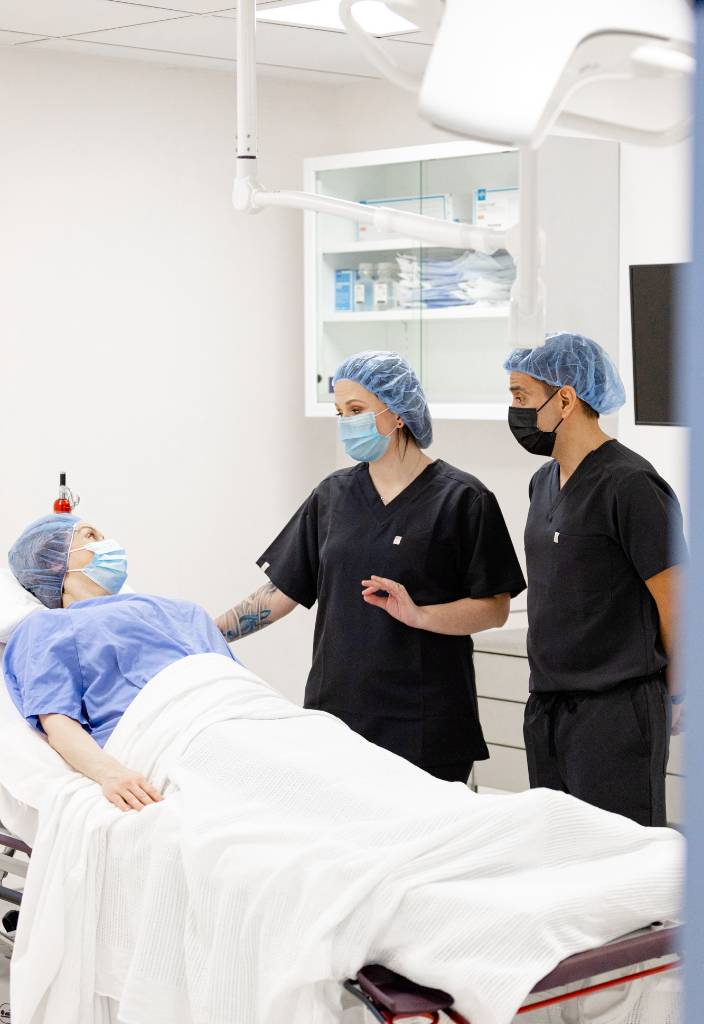A comprehensive range of assisted reproduction services.
Innovative fertility treatments.
We offer a full range of assisted reproduction services to all Quebecers who wish to start a family.
Several fertility services are also available to individuals in LGBT relationships (Lesbian, Gay, Bisexual, Transgender). Based on your situation and after some preliminary tests, your doctor will be able to prescribe the fertility treatment that best suits your needs.
Fertility Assessment
A proper diagnosis is the first step to realizing your dream of having a child.
You should seek consultation if:
- You are under 35 and have not conceived after 12 months of regular, unprotected sex.
- You are over 35 and have not conceived after 6 months of regular, unprotected sex.
- You are able to conceive but cannot carry pregnancies to term.
Women
Blood test
- Preconception assessment
- AMH, FSH, E2
- TSH
- PRL
- Other blood tests according to clinical history
Pelvic ultrasound
- 3D ultrasound
- Ovarian reserve with DFA
Hysterosonography or hysterosalpingography
- Study of tubal patency
Men
Blood test
- Preconception assessment
- Other blood tests according to clinical history
Semen tests
- Spermogram
- DNA fragmentation

In Vitro Fertilization. (IVF)
In Vitro Fertilization (IVF) is an assisted reproduction technique that involves fertilizing an egg with sperm outside the body in a laboratory.
This procedure, whether natural or stimulated, helps couples, single women, and individuals with specific medical issues to conceive naturally. IVF offers high success rates and helps diagnose and treat many causes of infertility.
The IVF process consists of several steps:
- Initial consultation
- Ovarian stimulation
- Egg retrieval
- Laboratory fertilization
- Embryo transfer
- Pregnancy test
ICSI (Intracytoplasmic Sperm Injection)
ICSI is an increasingly used assisted fertilization technique in which a single sperm is mechanically introduced into the cytoplasm of an egg. This method allows the selection of the best sperm for fertilizing the eggs.
ICSI is mainly for couples facing severe male infertility (low sperm count or quality), repeated IVF failures, or azoospermia requiring surgical sperm retrieval.
The ICSI process includes:
- Egg preparation
- Sperm selection
- Injection
- Incubation
- Follow-ups and checks
PESA/TESE (Testicular Sperm Retrieval)
PESA (Percutaneous Epididymal Sperm Aspiration) and TESE (Testicular Epididymal Sperm Extraction) are surgical techniques used by a fertility urologist to aspirate sperm directly from the epididymis or extract it from the testicle. The sperm collected is used to fertilize the partner’s or donor’s eggs.
These procedures are intended for men with:
- No sperm in the ejaculate (azoospermia)
- No live sperm in the ejaculate (necrospermia)
- Previous vasectomy or ejaculatory duct obstruction
- Severe sperm quality issues
- Low fertilization rates in previous treatments
Intrauterine Insemination (IUI)
Intrauterine insemination involves placing a prepared sperm sample directly into the uterus using a fine catheter. Depending on your situation, the sample may come from your partner or a donor. It is a simple, minimally painful method designed to assist fertilization in the natural environment of the sperm and egg.
IUI is typically for individuals with specific health or fertility issues or those unable to have intercourse.
The IUI process includes:
- Ovarian stimulation
- Cycle monitoring
- Sperm preparation
- Insemination
- Rest and follow-ups

Maximize your chances of pregnancy with Optimise, our affordable package designed to help more patients access the most advanced IVF care. Optimise combines non-invasive genetic testing of embryos (niPGTA) and the Time-lapse incubator, cutting-edge technologies that ensure a much safer journey for your embryos.
Non-invasive preimplantation genetic testing (niPGTA) is a revolutionary technique in fertility that analyzes embryos without damaging them, unlike traditional methods.
The Time-Lapse incubator is the most sophisticated IVF incubator available today. It allows embryos to remain in precise, undisturbed culture conditions, similar to those in the uterus.
Learn more about Optimise from one of our specialists.
Fertility preservation & donation
Egg/Sperm Freezing
Whether due to medical treatments, social reasons, or otherwise, egg and sperm freezing allows men and women to preserve their fertility for future use.
Egg Freezing Process:
- Health tests and ovarian reserve test
- Ovarian stimulation, including medication
- Egg retrieval, freezing, and storage
Sperm Freezing Process:
- Sample collection
- Sample analysis
- Treatment and preparation
- Freezing and storage
Egg and Sperm Donation
Donating eggs or sperm is a generous act that can help many people fulfill their dream of starting a family.
Egg Donation
This can be anonymous or directed, meaning the donor and recipient know each other. The donor must be 35 or younger, except in certain cases. Once all tests are completed, your doctor will confirm the donor’s eligibility and prescribe the agreed-upon protocols.
We are accredited by Cryos, FFX et Global Gamète Bank,Aphrodite Egg Bank, Donor Egg Bank USA (DEBUSA)
Sperm Donation
The sperm used at the Miracleo clinic comes from donors who have donated to sperm banks inspected and compliant with Health Canada standards, such as Canam cryoservices, Xytex Canada, Origin Sperm bank, Canada Cryobank
Lab services
Genetic Testing
Preimplantation Genetic Diagnosis (PGD) and Screening (PGS) are techniques in IVF labs to identify embryos with chromosomal abnormalities before transfer. Only viable embryos are transferred for IVF patients.
Want to know more? Our partner Igenomix now offers fascinating webinars on genetics. Click here to access them.
Preimplantation Genetic Testing for Aneuploidy (PGT-A)
PGT-A ensures the embryo has 23 pairs of chromosomes. Monosomy occurs when a chromosome is missing, and trisomy occurs when there is an extra chromosome. Abnormal embryos, often non-viable, are associated with low pregnancy rates and an increased risk of miscarriage (particularly in patients aged 40 and over).
Preimplantation Genetic Testing for Monogenic Disorders (PGT-M)
PGT-M identifies a mutation in a specific gene causing a hereditary disease passed from parent to child. It allows the identification of carrier embryos, preventing the transmission of the disease within the family. It is important to note that PGT-M targets a specific disease, not all conditions that may develop over a lifetime. Additionally, a non-carrier embryo may still be aneuploid, making it useful to combine PGT-A with PGT-M.
PGT-M requires creating a probe from a blood sample of the carrier parent and at least one other family member who is also a carrier.
Preimplantation Genetic Testing for Structural Rearrangements (PGT-SR)
PGT-SR identifies chromosomal rearrangements among the 46 chromosomes. It works similarly to PGT-A but is intended for couples with known chromosomal rearrangements, identified through a karyotype, targeting the affected chromosomes. These rearrangements are changes in chromosome structure, such as translocations or inversions, to avoid transferring embryos with imbalanced chromosomal rearrangements, which may lead to miscarriage.
Imaging
Imaging services are essential for providing detailed information about the anatomy and function of reproductive organs, allowing us to make accurate diagnoses and develop appropriate treatment plans.
Our facilities allow us to perform a wide range of imaging services:
- Hysterosonography (tubal patency)
- Basic ultrasound (3D and Ovarian Reserve)
- Pelvic transvaginal ultrasound
- Viability ultrasound
- Follow-up viability ultrasound

Dr. Stéphanie Goron, psychologist
Psychological support specialized in fertility, offered in close collaboration with our clinic.
We’re proud to be able to count on Stéphanie Goron, a psychologist specializing in perinatal care and fertility, to support our patients facing the complex challenges of infertility and assisted reproduction (ART).
With her in-depth understanding of the psychological issues associated with this process, Dr. Goron helps patients better manage the stress and emotions encountered when embarking on the path to assisted reproduction.



